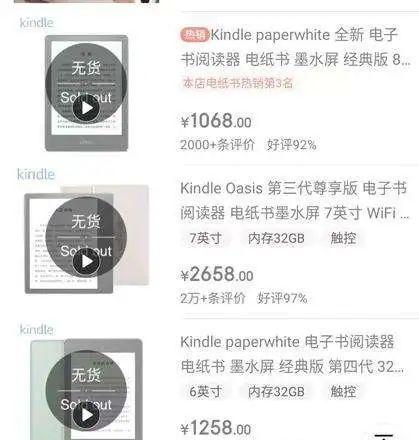Text | Wow
As a former Kindle veteran user, when I saw the news of "Kindle or quit the Chinese market", I still sighed in my heart, which was like saying goodbye to an old friend and remembering the reading time it accompanied.
In fact, I don't really care much about where the Kindle business goes in China, or whether the Kindle is a reading artifact or a bubble face cover. Even if the Kindle e-book store closes, I am not worried about "no books to read", after all, I have long cancelled the Kindle Unlimited monthly subscription service, and I still have the ability to find free e-book resources without spending a penny.

However, the reality is so harsh that I haven't opened the Kindle to read e-books for a long time that I can't even remember. Occasionally looking for a book and seeing it on the shelf, I will recharge it by hand, because a friend warned me that if I don't charge it for a long time, the Kindle's battery will break down, so I can't turn it on again.
Therefore, for me personally, the Kindle is already facing the embarrassing situation of "tasteless food, abandonment of pity". In fact, Kindle has gone from my new reading favorite to this step of the field, which is the past few years.
At that time, confined to renting a house and traveling for many years, I decided to start the Kindle in 2014, and since then it has been my good friend, and even once purchased the Kindle Unlimited monthly subscription service, full of Kindle fans.
It is difficult to deny that in the 21st century, internet technology has fully penetrated, and the wave of digital publishing has swept in. In contrast, Kindle's process from an e-reading pioneer to a marginal one is like the alternative impact of Kindle on paper books.
The impact of e-reading, represented by kindle, on the change of people's reading style and even knowledge production is immeasurable, but it does not confirm the prediction made by MIT professor Negroponte in 2010 that paper books will die out within five years.
However, it is still certain that the digital publishing industry, which will remain a sunrise industry in the future, will not change because of the existence of the Kindle.
Mobile phones with higher viscosity and embedded with people's work and life have gradually replaced single-function reading devices such as kindles and become "killer" applications in the digital publishing industry, emerging in an endless stream of mobile phone reading software to occupy the e-book market with better interactivity. The era of mobile phones packaging everything you and I live has arrived, and electronic reading is no exception.
With the iteration of 4G and 5G technology, the mobile app market has fully developed, and the reading software with an increasingly humanized design has captured me, and various reading apps have occupied a place in the limited memory of my mobile phone. On the subway, which commutes to work, a more convenient way to read on the phone eventually replaced the Kindle.
However, buying paper books online and visiting the bookstore in my spare time is still an important part of my life, especially every night of parent-child reading. Paper children's picture books once again beat mobile phone reading software, "intuitive, pleasant" reading experience, both small stickers and small handmade paper books, so that children are addicted, which is probably the short board of e-books.
Writer Radar once pointed out the essential difference between reading paper books and e-books, "Reading books needs to be 'shut down', needs to be immersed, needs to be single-minded, needs to temporarily cut off contact with the outside world, enter a state similar to life experience, even if reading pastime books, you must also enter it, in order to get its magic." ”
When people hold a book in their hands, they can truly feel its thickness, enjoy the fun of writing and painting, and can flip it over and jump to see, at this time, the text itself is a landscape. This pleasure of immersion eventually burns deeply into our memories. Mention a certain book, as if you can recall the scenes and emotions of reading.
In fact, reading paper books is more impressive than e-books, which has a scientific basis. Before about 4000 BC, in the process of human evolution, the brain coordinated the neural tissues in different regions to create a new circuit that served reading. So, our brains treat the entire text as some sort of physical landscape.
When we read, we construct psychological representations for words, thereby linking the meaning of words with structure and forming a coherent mental map of the text. For example, it's often easy to remember where a piece of text appears.
Technological progress undoubtedly provides us with more opportunities and possibilities. As for e-reading, how it acts on the reader's eyes, brain, and then affects its interpretive behavior, these need to be studied in depth by experts in various disciplines.
In addition, Microsoft has also shown that due to the temporary and intangible nature of e-books, many people do not have a strong sense of ownership of e-books. These people think they're using e-books instead of owning them, and once they like an e-book, they tend to buy a paper one. Of course, I am one of them, and having a study full of books is still part of my pursuit of my ideal life.
Technological change and media change are the general trend, just as no one can read bamboo books today, the emergence and disappearance of kindles are the same, and alternatives will eventually be. However, Negroponte's prediction of the demise of paper books is unlikely to be realized in another decade, and the debate over whether to choose e-reading or paper-based reading will surely continue.
Text: 翛然
Column moderator: Zhang Yongqun
Editor-in-charge: Wang Yuanfang
Editor: Chang Ying, Zhu Xiaofan